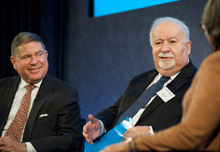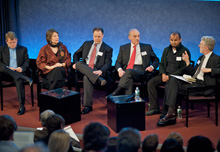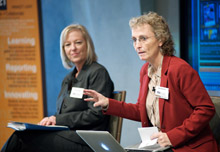
February 11, 2010 — To hold a conference on the future of journalism education, the Carnegie Corporation and Knight Foundation chose a stronghold of journalism, New York City. The venue was the Paley Center for Media and the occasion, “A Way Forward: Solving the Challenges of the News Frontier.”
The conference brought together deans, educators and students from many of the institutions that make up the Carnegie-Knight Initiative on the Future of Journalism Education as well as working journalists. Despite a snowstorm that arrived the night before, more than 170 attendees made their way to New York for the event.
Thursday night featured a discussion about the state of journalism education with Vartan Gregorian, president of Carnegie Corporation, and Alberto Ibargüen, president and CEO of the Knight Foundation. Friday started with “The Hunt for the Newsroom of Tomorrow,” a panel discussion moderated by Andrew Heyward, former president of CBS News.
The panel’s composition guaranteed different points of view: Eliot Pierce of The New York Times and Alan Murray, deputy managing editor of The Wall Street Journal, work in traditional media organizations that are fundamentally transforming themselves to meet the realities of the online world. Josh Cohen of Google News and Martin Moe of AOL Media run Internet-centered companies broadening their reach.
Cohen noted that because Google “doesn’t really have a newsroom,” users play the role of editors by customizing what they see. At the same time, the company is “learning what [readers] need to know.” For Murray, “The best journalists are the ones who are in constant contact with the people they’re writing for, who are paying close attention to what those people want to know.”

At the Times, Pierce said three big changes were in the works: First, the introduction of a “paid tier” to complement the existing advertising model. Second, increased development for mobile readers such as the iPad, Kindle and smart phones. “The support of it is going to take its toll,” he said. “It’s only going to get worse.” When asked how journalism students can prepare, he had a specific suggestion: “Focus more on HTML5 rather than Flash.” The Times’ third change is its growing emphasis on social media, especially “the two platforms that matter,” Facebook and Twitter.
The discussion featured some lively exchanges, particularly between the mainstream giants, the Times and the Journal, and the newer players. When AOL’s Martin Moe said his firm was “hiring journalists at a rapid clip,” he was pressed on specifics — how many, what status, and especially what compensation. “Does ‘distributed journalism’ mean people who work at home, or is it a metaphor for ‘people who don’t get paid’?” asked Murray.
While the two traditional media organizations remained skeptical about the notion of citizen-generated news, the Times did see the possibility of readers contributing applications. “You’re saying that some of the customers might be able to go into the kitchen and cook, too,” observed the moderator, Andrew Heyward.
The morning event was followed by four interactive sessions, including “The News21 Experience.” It was preceded by a presentation of the Journalist’s Resource website by Thomas E. Patterson of the Shorenstein Center. A project of the Carnegie-Knight initiative, the site’s mission is to promote knowledge-based reporting by providing educators, students and journalists with access to scholarly reports and papers on a wide range of topics.
Conference participants came back together for the second morning discussion, “Real Tales from the Real World: Education of the Entrepreneurial Journalist.” It featured Rafat Ali of ContentNext Media, GlobalPost‘s Phil Balboni, John Harris of Politico, and John Thornton of The Texas Tribune, as well as Geneva Overholser of USC’s Annenberg School for Communication and Journalism. The panel was moderated by Jeff Jarvis of CUNY’s Graduate School of Journalism.

Asked to suggest what educators could do to prepare students for the real world of journalism, Balboni said they should “break down the silos” between once-separate forms of journalism. “Digital should be the core of everything.” His second recommendation was to teach entrepreneurship and “the business of news.” Students should know how to write a business plan and balance generating revenue with controlling expenses. “There’s no shame for a journalist to love creating a spreadsheet.”
In contrast to Balboni’s for-profit GlobalPost, Thornton started The Texas Tribune as a nonprofit after he came to the conclusion that “this ‘serious journalism stuff’ is a public good.” He felt that the market wouldn’t provide complete coverage, particularly on the state level. As for what educators could do, “Salespersonship needs to be taught, period. The skill of asking for money.” This would be necessary because “public media will have to be a bigger part of the equation 10 years from now than it is today.”
Overholser was open to the idea of a government-funded model: “Our response to government funding shouldn’t automatically be ‘Eek!’ ” Whatever the funding structure, she stressed the importance of journalists striving to create their own brands. “Five years ago, I’d have rather cut out my own tongue than say to a journalist, ‘Be your own brand,’ ” but today branding and marketing are essential.
The afternoon discussion was “Reaching the Audience in a Fragmented Media Landscape.” Moderated by Andrew Golis of Yahoo, the featured panelists were Bill Adair, founder of PolitiFact.com; Ted Anthony of the Associated Press; Rachel Davis Mersey of the Medill School of Journalism; and Jack Wakshlag, Chief Research Officer of Turner Broadcasting.
More information on the Carnegie-Knight conference is available on the Paley Center for Media’s website, PaleyCenter.org.
This article was written by Leighton Walter Kille of the Shorenstein Center. The photos are by Brian Friedman.

